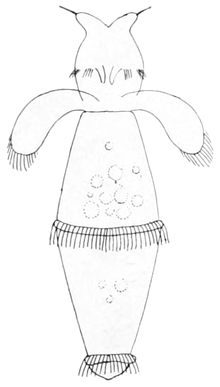Paedoclione doliiformis
| Paedoclione doliiformis | |
|---|---|
| Scientific classification | |
| Domain: | Eukaryota |
| Kingdom: | Animalia |
| Phylum: | Mollusca |
| Class: | Gastropoda |
| Clade: | Euopisthobranchia |
| Order: | Pteropoda |
| Family: | Clionidae |
| Genus: | Paedoclione Danforth, 1907[1] |
| Species: | P. doliiformis
|
| Binomial name | |
| Paedoclione doliiformis | |
Paedoclione doliiformis is a species of sea angel, a small floating sea slug, a pelagic marine gastropod mollusk in the family Clionidae.
Paedoclione doliiformis is the only species in the genus Paedoclione.[2]
The generic name is a reference to the paedomorphic habit of this genus, which retains many larval features throughout its life.[3]
Paedoclione doliiformis was originally described by Charles Haskell Danforth in 1907.[1] It was not collected by zoologists for the next 61 years.[4] It was rediscovered in 1968 by Lalli (1972).[4]
Distribution
[edit]The type locality of Paedoclione doliiformis is Casco Bay, Portland, Maine.[1]
The distribution includes St. Margarets Bay, Nova Scotia, the Gulf of Maine[3][4] and possibly elsewhere.
Description
[edit]
Paedoclione doliiformis retains juvenile (larval) physical characteristics for the whole of its life.[4] This is called neoteny (a kind of pedomorphosis).[4]
The body length is up to 1.5 mm.[2] Paedoclione doliiformis has no shell.[2]
It is a gelatinous, mostly transparent pteropod, and it only has a shell in its embryonic stage.[citation needed]
The orange visceral sac is confined to the anterior part.
Life cycle
[edit]Mating is carried out ventrally for mutual fertilization. The following spring, this results in a free-floating, gelatinous egg mass.
Eggs hatch after three days, and the shell is retained until the 11th day.[3]
Feeding habits
[edit]Paedoclione doliiformis feeds exclusively on Limacina helicina and on Limacina retroversa, but solely on juveniles with shells smaller than 1 mm.[5] Its abundance is closely linked to that of its prey.[3]
References
[edit]- ^ a b c d Danforth C. H. (1907) "A new pteropod from New England". Proceedings of the Boston Society of Natural History 34: 1–19, figs A-B, pls 1–4. (with introduction by J. S. Kingsley) page 2.
- ^ a b c "Genus Paedoclione". Marine Species Identification Portal, accessed 4 February 2011.
- ^ a b c d Lalli C. M. & Conover R. J. (1973). "Reproduction and development of Paedoclione doliiformis, and a comparison with Clione limacina (Opisthobranchia: Gymnosomata)". Marine Biology 19(1): 13–22. doi:10.1007/BF00355415.
- ^ a b c d e Lalli C. M. (1972). "Food and feeding in Paedoclione doliiformis Danforth, a neotenous gymnosomatous pteropod". Biological Bulletin 143(2): 392-402, 4 figs. abstract and PDF.
- ^ Lalli C. M. & Gilmer R. W. (1989). Pelagic Snails. The biology of holoplanktonic gastropod molluscs. Stanford University Press: Stanford, California. page 185, 188.
